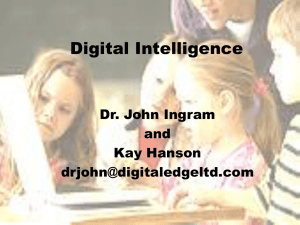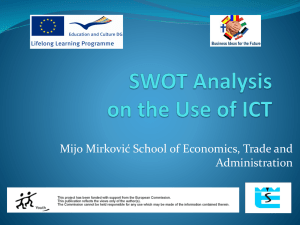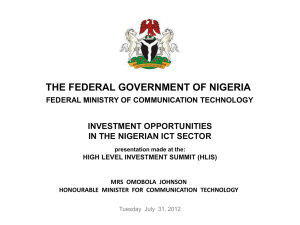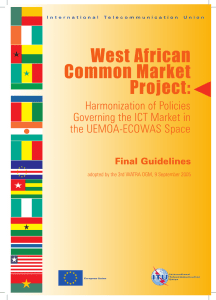1 DIGITAL VENICE 2014 MAKING THE RIGHT
advertisement
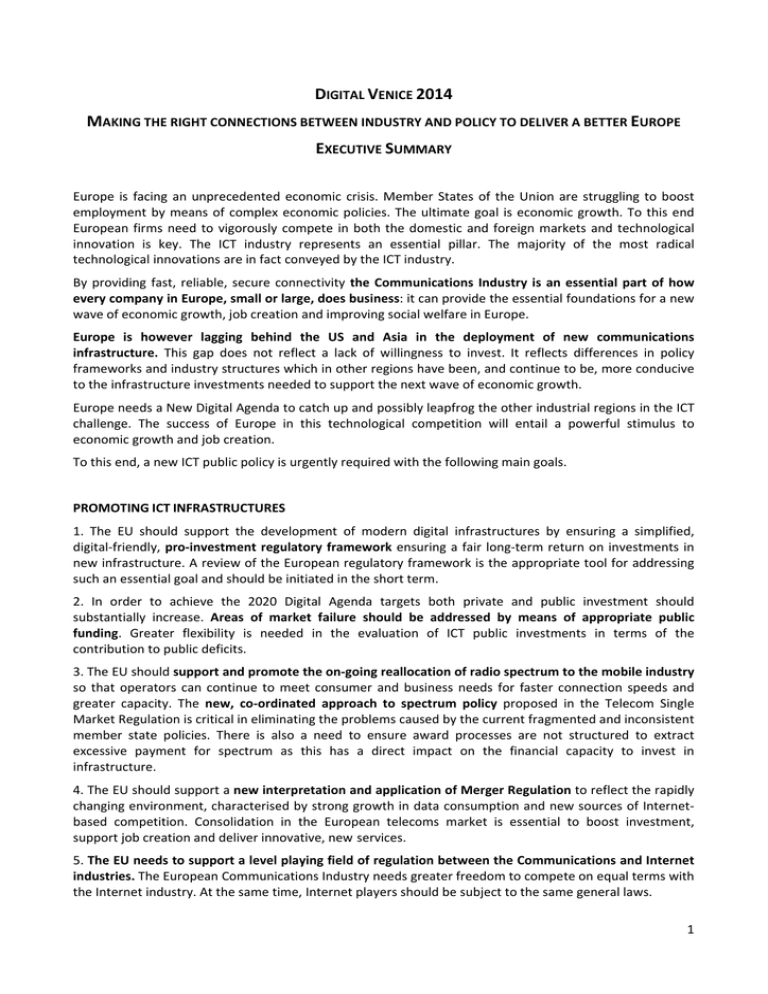
DIGITAL VENICE 2014 MAKING THE RIGHT CONNECTIONS BETWEEN INDUSTRY AND POLICY TO DELIVER A BETTER EUROPE EXECUTIVE SUMMARY Europe is facing an unprecedented economic crisis. Member States of the Union are struggling to boost employment by means of complex economic policies. The ultimate goal is economic growth. To this end European firms need to vigorously compete in both the domestic and foreign markets and technological innovation is key. The ICT industry represents an essential pillar. The majority of the most radical technological innovations are in fact conveyed by the ICT industry. By providing fast, reliable, secure connectivity the Communications Industry is an essential part of how every company in Europe, small or large, does business: it can provide the essential foundations for a new wave of economic growth, job creation and improving social welfare in Europe. Europe is however lagging behind the US and Asia in the deployment of new communications infrastructure. This gap does not reflect a lack of willingness to invest. It reflects differences in policy frameworks and industry structures which in other regions have been, and continue to be, more conducive to the infrastructure investments needed to support the next wave of economic growth. Europe needs a New Digital Agenda to catch up and possibly leapfrog the other industrial regions in the ICT challenge. The success of Europe in this technological competition will entail a powerful stimulus to economic growth and job creation. To this end, a new ICT public policy is urgently required with the following main goals. PROMOTING ICT INFRASTRUCTURES 1. The EU should support the development of modern digital infrastructures by ensuring a simplified, digital‐friendly, pro‐investment regulatory framework ensuring a fair long‐term return on investments in new infrastructure. A review of the European regulatory framework is the appropriate tool for addressing such an essential goal and should be initiated in the short term. 2. In order to achieve the 2020 Digital Agenda targets both private and public investment should substantially increase. Areas of market failure should be addressed by means of appropriate public funding. Greater flexibility is needed in the evaluation of ICT public investments in terms of the contribution to public deficits. 3. The EU should support and promote the on‐going reallocation of radio spectrum to the mobile industry so that operators can continue to meet consumer and business needs for faster connection speeds and greater capacity. The new, co‐ordinated approach to spectrum policy proposed in the Telecom Single Market Regulation is critical in eliminating the problems caused by the current fragmented and inconsistent member state policies. There is also a need to ensure award processes are not structured to extract excessive payment for spectrum as this has a direct impact on the financial capacity to invest in infrastructure. 4. The EU should support a new interpretation and application of Merger Regulation to reflect the rapidly changing environment, characterised by strong growth in data consumption and new sources of Internet‐ based competition. Consolidation in the European telecoms market is essential to boost investment, support job creation and deliver innovative, new services. 5. The EU needs to support a level playing field of regulation between the Communications and Internet industries. The European Communications Industry needs greater freedom to compete on equal terms with the Internet industry. At the same time, Internet players should be subject to the same general laws. 1 ENSURING DIGITAL CITIZENSHIP 1.Digitalisation of the Public Administration will be a critical catalyst for the spread of ICT in Europe. Telecom operators are ready to participate in ambitious projects for the timely digitalisation of Public Administration, Schools and Healthcare. 2. Fast broadband networks and the transition to full IP will allow an array of new and innovative services. A balanced approach to Open Internet regulation is required in order to support the availability of customized services differentiated on the basis of quality and price. Net Neutrality is not the right solution. 3.European citizens need to retain control of their "digital life”. The EU needs to address any bottlenecks that persist due to a lack of interoperability or lack of portability of content and data when accessing from different platforms or providers. An open and non‐discriminatory framework, concerning both telecommunications operators and Internet companies must be put in place. 4. A coordinated approach to data privacy and digital security is needed to help build trust and confidence in the uptake and use of new digital services by EU citizens and provide them with effective and consistent protection across the digital value chain. These high standards of data protection and security must be harmonised across Europe and made applicable to companies based outside the region. Mobile industry can provide fit for purpose new digital identity services such as the GSMA Mobile Connect service which offers broad interoperability across operators and service providers. STIMULATING JOB CREATION 1. Telecoms operators in Europe represent one of the driving forces of the European economy. With an aggregate annual turnover of hundreds of billions of euros they employ millions of people. The EU should support the creation of policy frameworks that encourage telecom operator investments in ICT which, in the order of tens of billions of euro each year, can represent a big boost for the European economy in the next five years, supporting both direct and indirect employment. 2. The EU should support welfare policies that promote the qualitative change in skills required in the labour market. This re‐tooling of the European labour market is essential if the region is to regain a position of leadership in the Digital Economy and maximize the potential impact on growth and development. 3. European institutions must ensure that a stronger innovation ecosystem can develop in Europe. Public policy should favour all mechanisms useful to amplify economic returns from ICT research investments: improving the business environment, encouraging entrepreneurial attitudes, supporting training in young and small enterprises, improving access to debt and equity finance when necessary, and promoting innovation and internationalization activities of new and small firms. 4. Europe needs a reinvigorated stimulus to the European Digital Service Start‐up eco‐systems. This program should be rationalized and focused on a smaller number of excellence programs, more specialized on “Internet economy” and with a pan European scope. GOVERNING THE GLOBAL CHALLENGES OF INTERNET Europe must play a key role in shaping the future of global Internet governance. The Internet needs to be governed by a coherent set of principles shared by all stakeholders. The current multi‐stakeholder model, based on the participation on equal footing of different stakeholders such as governments, private sector and civil society, need to be substantiallystrengthened. Globalizing key decision‐making (for example the coordination of domain names and IP addresses) is key to safeguarding the stability, security and resilience of the Internet. This process should be achieved by establishing a clear timeline for the globalization of the Internet Corporation for Assigned Names and Numbers (ICANN) and of the Internet Assigned Numbers Authority (IANA). 2




